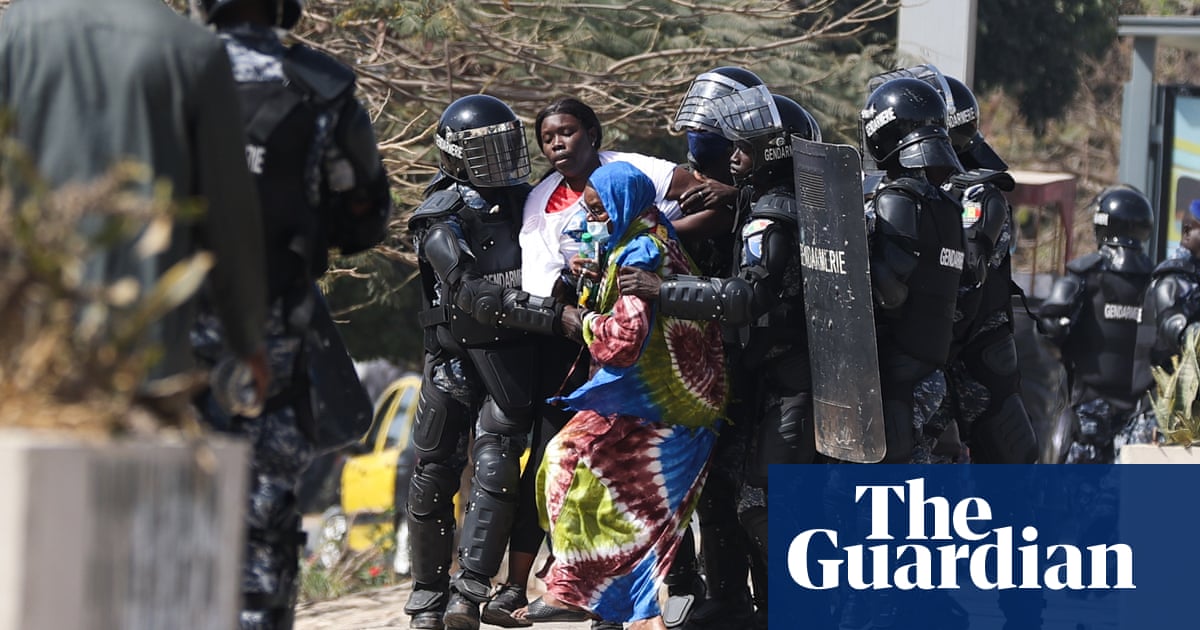
An Extinction Rebellion activist whose home was raided by Western Australia’s counter-terror police over a chalk message has had the case against her thrown out by a Perth magistrate.
Rosa Hicks was one of six arrested after a group of activists used washable chalk paint to write messages on a pedestrian bridge in Perth within view of Woodside’s headquarters to protest the company’s development of the $16bn Scarborough gas project.
Hicks was not involved in applying the paint, arrived after the protest had started and took photos on someone else’s phone. She said she did not take any active part and was very conscious of avoiding any violation of the conditions of her visa.
Two weeks after the protest, on 19 August 2021, officers with the state security investigation group – a division of the Western Australian police force referred to as the state’s “counter-terrorism police” – raided the homes of the six activists in the early hours of the morning.
Four people who actually applied the paint have since pleaded guilty to damaging property by graffiti and received fines and a fifth activist is awaiting a trial to begin in April. However, police prosecutors maintained that Hicks’ photographing the incident amounted to aiding and abetting, despite her not being involved in applying the messages.
At a trial in the Perth magistrates court on Monday, prosecutors played half an hour of CCTV footage tracking Hicks’ movements that confirmed her account of events and a recording of the interview she gave police during the raid on her home.
Magistrate Matthew Holgate, however, threw out the case on the grounds it had no legal basis. WA police were ordered to cover Hicks’ legal costs of $3,300.
Hicks, who is from the UK, described the decision as an “anti-climactic relief” as police prosecutors had been steadfast in keeping the prosecution going.
“It’s just a huge waste of time. A huge waste of money. A huge waste of state security resources,” Hicks said.
“Not only have they wasted all those resources but they’ve treated me like a dangerous criminal by not allowing me to see my friends with non-association bail conditions and taking my phone, making me feel like I was really dangerous.
“I’ve had to go through all this stress, I’ve had to have my house raided, I’ve had to live in fear of being deported, when in actual fact there was no case.”
Hicks’ lawyer, Anthony Eyers, a barrister with Equus Chambers in Perth said any prosecution would have set a bad precedent by criminalising the act of being near protest actions.
“It’s the thin end of the wedge,” Eyers said. “If these prosecutions are allowed to stand, they will invariably generate precedents affecting fundamental freedom of expression and freedom of movement, and association.
“It’s an unfortunately trivial example of how easy people’s fundamental rights could be eroded against the background of [governments] promoting the interests of big businesses to the detriment of the environment.”
The decision comes as other environmental protesters have had strict non-association bail conditions and harsh financial penalties imposed – contributing to what some human rights groups and NGOs say is an alarming trend of repression around the country.
In November, three activists with the Scarborough Gas Action Alliance blockaded the only road into the Burrup Peninsula in WA’s far north for 16 hours. The area is home to a significant amount of gas industry infrastructure.
Caleb Houseman, who took part in the protest, received a $1,100 fine after pleading guilty in late December to failing to comply with a move on notice, obstruction of a carriageway and obstruction of police.
The magistrate rejected an attempt to impose an additional $55,000 in restitution to WA police after finding prosecutors failed to cite proper legal authority to justify the charge and did not give his lawyers adequate time to respond.
Sophie McNeill, the Australia researcher with Human Rights Watch, said the decision in Hicks’ case was a sensible outcome to an “overzealous” prosecution.
“There has been a concerning trend in Australia recently with police targeting peaceful climate activists with overly harsh tactics and charges,” McNeill said.
“The magistrate rightly threw out these charges and I think it shows how excessive and overzealous the WA authorities were in pursuing this case.”












